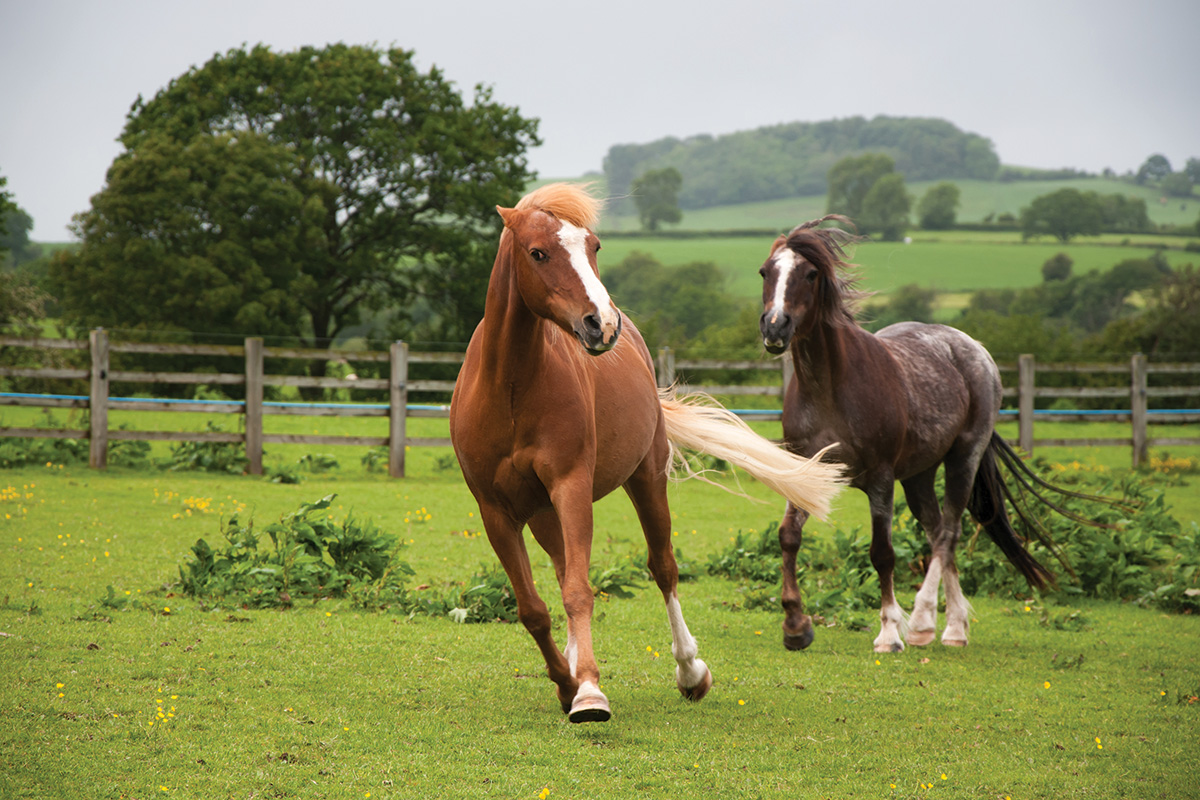What is the Cause of Your Horse’s Behavior?
If asked what type of personality your horse has, you might say he’s an alpha, stubborn, people-pleasing, nervous, difficult, easy-going, bold, bombproof, or some other personality trait. You may also believe your assessment is accurate because you know your horse inside and out. You may be 100 percent correct, but you could also be completely mistaken. How could that be if every time you see your horse, his behavior confirms your opinion?


Dictated by Experience
Personality is a hard-wired part of your horse’s psyche. It’s a composite of genetic traits and inherent characteristics, along with that special something that makes every horse unique.
The problem with personality-typing a horse based on his actions (or inactions) is that behavior is contingent on experience. That means you’re observing how your horse responds to life versus who he is on a fundamental level.
For instance, let’s say your horse behaves aggressively around other horses. He’s labeled as having a dominant/aggressive personality. We need to look deeper to discover the true motivation behind the aggressive behavior, such as having poor social skills, feeling overwhelmed in large groups, or being bullied earlier in life.
People-pleasing, submissiveness, stubbornness, and excitability are other ways we may describe equine personalities, when in fact they are actually adaptive coping skills. While they are natural responses to stress, especially long-term distress, they are not a healthy state of being.
Appeasement behavior is often misinterpreted as people-pleasing because the horse avoids unpleasant consequences by trying really hard to do what is expected of him. Submissiveness isn’t a personality type, but horses can learn to behave submissively.
When a horse doesn’t stand up for himself, it can be simply because he lacks the motivation to do so. Imagine a horse with a carrot letting another horse take it because avoiding conflict is more appealing to him than the carrot. Another form of submissive behavior occurs when taking a stand leads to a disagreeable conclusion.
Just as often misunderstood, a horse classified as a “stubborn” personality may be reluctant to comply because of emotional distress and/or physical pain. Hoof pain, poor saddle fit, and confusing cues are enough to make any horse want to shut down and refuse to move.
You need to look beyond personality to identify the forces at work that are truly responsible for your horse’s actions. You also need to accept that you will never know with any certainty why your horse behaves the way he does. You would need to be able to read your horse’s mind to know that—a skill most of us don’t possess.
Keep a lid on speculation, too. The odds are you’ll be wrong, and acting on false assumptions can lead to detrimental consequences for you and your horse.
Questions to Ask to Determine Causes of Behavior
The closest you can get to understanding the source of your horse’s behavior is by doing your best to answer these three questions. (Results are subject to interpretation and fall under the category of somewhat educated guess.)
1. What purpose does the behavior serve?
Purpose is at the heart of everything your horse does. The question is, how does avoiding the trailer, refusing to stand at the mounting block, pawing the ground at feeding time, or kicking at the farrier get your horse what he wants or needs?
2. What is triggering the horse’s behavior?
Triggers, also known as antecedents, set behavior in motion. They are environmental (sights, sounds), internal or external physical sensations (back pain, hoof imbalance, girth sores), or connections your horse has made with previous experiences (associations).
Emotions also function as triggers, primary motivators, and responses to environmental and/or physical stimuli. An emotional trigger might be excitement about approaching food that results in pawing.
Emotionally charged memories are powerful, too. For instance, your horse can recall pain from a previous experience as he’s being asked to approach the mounting block. The closer he gets, the more anxious he feels.
His self-preservation instincts take over, and he stops in his tracks—a sensible behavioral response (and not at all personality driven) to the situation.
3. What is the consequence of the horse’s behavior?
Consequence is how your horse feels about the outcome of a behavior. Discover that, and you have a predictive tool for how he may behave in the future, especially under similar circumstances.
For instance, if the consequence of pawing is that your horse gets his bucket, he’s more likely to paw again at the next mealtime. On the other hand, if asking him to lift his left foot has an unpleasant outcome, causing pain in his right foot, it would be no surprise if future requests were met with a no.
When you understand your horse’s motivations, you are better equipped to help him feel safe, joyful and let his true personality shine through.
This article about horse behavior appeared in the March 2023 issue of Horse Illustrated magazine. Click here to subscribe!
Recent Posts
How to Clean a Horse’s Sheath
If you’ve never cleaned a horse’s sheath, you probably have questions. First and foremost, is it really necessary? And more…
All Three Equestrian Sports Receive Final Confirmation for the LA 2028 Olympic Games
After a nail-biting two years of speculation about the inclusion of equestrian sports in the next Olympic Games, it was…
ASPCA Right Horse Adoptable Horse of the Week: Xanthus
Welcome to Horse Illustrated’s weekly installment of the Right Horse Adoptable Horse of the Week, offered in partnership with the…
Be Your Horse’s Joint Health Champion
Equine arthritis can affect horses of all disciplines and ages, and early intervention is crucial for maintaining comfort and performance.…
Tamie Smith: Taking It To The Next Level
Mother, grandmother, and winning 5* eventing rider—these three titles don’t typically go together. However, Tamie Smith, 49, is all of…
Organize & Customize Your Horse Trailer Storage
Organize and customizer your new horse trailer by adding a few simple storage items. I’ve been on the search for…